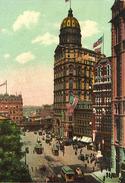Recently Detroit, under orders from a state-appointed emergency manager, became the largest U.S. city to go bankrupt. This stirred predictable media speculation about why the city, which at 1.8 million was once America’s 5th-largest, declined in the first place. Much of the coverage simply listed Detroit’s longtime problems rather than explaining their causes. read more »
Newgeography.com - Economic, demographic, and political commentary about places
America Hanging in There Better Than Rivals
To paraphrase the great polemicist Thomas Paine, these are times that try the souls of optimists. The country is shuffling through a very weak recovery, and public opinion remains distinctly negative, with nearly half of Americans saying China has already leapfrogged us and nearly 60 percent convinced the country is headed in the wrong direction. Belief in the political leadership of both parties stands at record lows, not surprisingly, since we are experiencing what may be remembered as the worst period of presidential leadership, under both parties, since the pre-Civil War days of Franklin Pierce and James Buchanan. read more »
125 Years of Skyscrapers
Skyscrapers have always intrigued me. Perhaps it began with selling almanacs to subscribers on my Oregon Journalpaper route in Corvallis. I have continued to purchase almanacs each year and until recently, the first thing I would do is look in the index for "Buildings, tall” in the old Pulitzer The World Almanac, the best source until the Internet.
My 1940 edition is the first in which “Buildings, tall” appears. The world of skyscrapers has changed radically through the years. read more »
Children and Cities
Central cities are not likely to regain their former population. However, some of them may have reached an important inflection point—population growth has returned to at least some of the largest (and longest-declining) cities. For example, New York City’s population has increased by more than one million since 1990, after declining by about one million between 1950 and 1980. Over the past decade, nine of the ten largest (and 17 of the 20 largest) cities in the United States have gained population. read more »
Mobility for the Poor: Car-Sharing, Car Loans, and the Limits of Public Transit
Public transit systems intend to enhance local economies by linking people to their occupations. This presents problems for many low-income families dependent on transit for commuting. With rising prices at the gas pump, much hope has been placed on an influx of investment into public transit to help low-income households. But does public transit really help the poor? read more »
What Detroit Has Really Taught America
Nothing. Seriously. Not a damn thing.
Oh, the occasion is being used to opine on our state of affairs, but nothing is structurally taking shape in America to prevent the next Detroit from occurring. In fact, Detroit is occurring every day inside most of us. We are all getting bankrupt in so many little ways. read more »
Here’s a Way to Flood the US Housing Market with One Trillion Dollars
Members of the millennial generation – born between 1982 and 2003 – carry a student debt burden of close to one trillion dollars. This is the group that includes many just entering the stage in life when people tend to settle down and start families. Even though Millennials are marrying later than previous generations, they would still be the prime market for sales of single family starter homes, if only they could afford them. read more »
California Homes Require Real Reach
In the 1950s and 1960s, Southern California was ground zero for the "American Dream" of owning a house. From tony Newport Beach and Bel-Air to the more middle-class suburbs of the San Fernando Valley and Garden Grove to working-class Lakewood, our region created a vast geography of opportunity for prospective homeowners. read more »
Singapore Seeks Its Home
August 9th is National Day in Singapore, and it is accompanied by both public and private celebrations. From my family’s flat in the public housing estate of Hougang, we can hear the roar of jet planes over our heads as they make their way to the National Day Parade grounds for a fly-past and appear shortly before our eyes on the television screen. read more »
Land Planners Dig In Again
In the housing industry, land planners are the first to be dropped during a downturn… and the first needed in an upturn. A good way to monitor the optimism of the housing development market is to monitor the volume of land planning.
The land plan is the beginning of a long and arduous process. Unlike architecture, which is relatively quick from design to construction, land planning takes patience. It can easily consume a year or two (or more) for a US neighborhood to go from the initial design stages to the beginning of construction. read more »





















